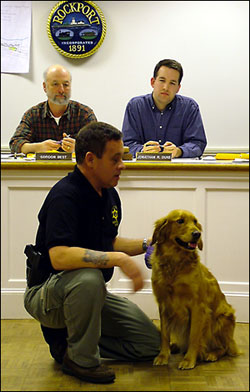Newsbrief:
Supreme
Court
Allows
Drug
Dog
Vehicle
Searches
Without
Cause
1/28/05
The Supreme Court has once again expanded the ability of police to conduct warrantless searches, this time okaying the use of drug-sniffing dogs to check motorists detained for traffic violations even when police have no reason to suspect they have committed a crime. The decision provides constitutional protection for what has become an increasingly common practice on the nation's highways in the war on drugs. It also, according to an impassioned dissenting opinion, could lead to widespread drug dog sweeps of sidewalks and parking lots.
At the Supreme Court Cabelles' attorney argued that the Fourth Amendment protects motorists from searches such as dog sniffs, which he said could be humiliating and intimidating and should not be allowed without particularized suspicion. But the state of Illinois, backed by the Bush administration Department of Justice -- and precedent in the federal courts -- argued that walking a drug-sniffing dog around a vehicle to see if it could detect illicit drugs was not a "search." In a 6-2 decision, the Supreme Court found for the state. "The dog sniff was performed on the exterior of respondent's car while he was lawfully seized for a traffic violation," wrote Justice John Paul Stevens for the majority. "Any intrusion on respondent's privacy expectations does not rise to the level of a constitutionally cognizable infringement." But Stevens wasn't done yet. "A dog sniff conducted during a concededly lawful traffic stop that reveals no information other than the location of a substance that no individual has any right to possess does not violate the Fourth Amendment," he added. Still, at least for two justices, providing a constitutional imprimatur for suspicionless drug dog sniffing of vehicles was too much. In a dissent joined in part by Justice David Souter, Justice Ruth Bader Ginsburg warned that the majority opinion could make traffic stops more "adversarial" and lead to widespread drug dog searches. "Injecting such animals into a routine traffic stop changes the character of the encounter between the police and the motorist. The stop becomes broader, more adversarial and (in at least some cases) longer," she wrote. "Under today's decision, every traffic stop could become an occasion to call in the dogs, to the distress and embarrassment of the law-abiding population," she wrote. The decision "clears the way for suspicionless, dog-accompanied drug sweeps of parked cars along sidewalks and in parking lots." While Monday's ruling allows police to use the occasion of a traffic stop to let drug-sniffing dogs check out a vehicle, it does not allow for the indefinite detention of drivers to give the dogs time to arrive to do the non-search search. Lower federal courts have varied in determining what period of time constitutes a constitutionally permissible detention, with some allowing waits of up to 90 minutes. Steven Silverman, executive director of the Flex Your Rights Foundation, counsels drivers confronted with threats of calling in the drug dogs to exercise their rights and simply ask to be on their way. "Basically, if police can't bring a dog to the scene in the time it takes to run your tags and write a ticket, the use of the dog becomes constitutionally suspect," said Silverman. "In our video, 'BUSTED: The Citizen's Guide to Surviving Police Encounters,' we warn viewers that police will often threaten to bring dogs to the scene. Since police cannot detain you for the purpose of investigating an additional crime -- unless they have evidence you've committed one -- our advice is still to ask if you are free to go." Click here to read the case, Illinois v. Caballes, 03-923, online -- scroll down to reach the opinion.
|

